 W
WAn election is a formal group decision-making process by which a population chooses an individual or multiple individuals to hold public office.
 W
WA campaign manager, campaign chairman, or campaign director is a paid or volunteer individual whose role is to coordinate a political campaign's operations such as fundraising, advertising, polling, getting out the vote, and other activities supporting the effort, directly.
 W
WA legislative chamber or house is a deliberative assembly within a legislature which generally meets and votes separately from the legislature's other chambers. Legislatures are usually unicameral, consisting of only one chamber, or bicameral, consisting of two, but there are rare examples of tricameral and tetracameral legislatures. The Socialist Federal Republic of Yugoslavia is the only country documented as having a pentacameral legislature.
 W
WIn political science and sociology, a cleavage is a historically determined social or cultural line which divides citizens within a society into groups with differing political interests, resulting in political conflict among these groups. Social or cultural cleavages thus become political cleavages once they get politicized as such. Cleavage theory accordingly argues that political cleavages predominantly determine a country's party system as well as the individual voting behavior of citizens, dividing them into voting blocs. It is distinct from other common political theories on voting behavior in the sense that it focuses on aggregate and structural patterns instead of individual voting behaviors.
 W
WCompulsory voting, also called mandatory voting, is the requirement in some countries that eligible citizens register and vote in elections. Penalties might be imposed on those who fail to do so without a valid reason. According to the CIA World Factbook, 21 countries, including 10 Latin American countries, officially had compulsory voting as of December 2017, with a number of those countries not enforcing it.
 W
WCongresses are formal meetings of the representatives of different countries, constituent states, organizations, trade unions, political parties or other groups. The term originated in Late Middle English to denote an encounter during battle, from the Latin congressus.
 W
WDemocracy is a form of government in which the people have the authority to deliberate and decide legislation, or to choose governing officials to do so. Who is considered part of "the people" and how authority is shared among or delegated by the people has changed over time and at different rates in different countries, but over time more and more of a democratic country's inhabitants have generally been included. Cornerstones of democracy include freedom of assembly, association and speech, inclusiveness and equality, citizenship, consent of the governed, voting rights, freedom from unwarranted governmental deprivation of the right to life and liberty, and minority rights.
 W
WAn election address is the material sent out by a candidate during a political campaign. Election Addresses are normally only sent out during the election period itself. Other political leaflets are usually known by different names.
 W
WAn election audit is any review conducted after polls close for the purpose of determining whether the votes were counted accurately or whether proper procedures were followed, or both.
 W
WElection day or polling day is the day on which general elections are held. In many countries, general elections are always held on a Saturday or Sunday, to enable as many voters as possible to participate; while in other countries elections are always held on a weekday. However, some countries, or regions within a country, which hold elections on a weekday declare election day a public holiday. Countries which permit absentee ballots, early ballots or postal votes to be cast by mail before the election avoid the problem altogether by enabling voters to vote on a day that is more convenient to them.
 W
WElection forensics are methods used to determine if election results are statistically normal or statistically abnormal, which can indicate electoral fraud. It uses statistical tools to determine if observed election results differ from normally occurring patterns. These tools can be relatively simple, such as looking at the frequency of integers and using 2nd Digit Benford's law, or can be more complex and involve machine learning techniques.
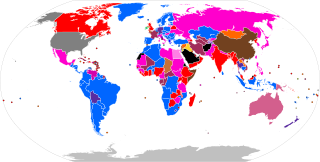 W
WAn electoral system or voting system is a set of rules that determine how elections and referendums are conducted and how their results are determined. Political electoral systems are organized by governments, while non-political elections may take place in business, non-profit organisations and informal organisations. These rules govern all aspects of the voting process: when elections occur, who is allowed to vote, who can stand as a candidate, how ballots are marked and cast, how the ballots are counted, how votes translate into the election outcome, limits on campaign spending, and other factors that can affect the result. Political electoral systems are defined by constitutions and electoral laws, are typically conducted by election commissions, and can use multiple types of elections for different offices.
 W
WThe Inter-Parliamentary Union is an international organization of national parliaments. Its primary purpose is to promote democratic governance, accountability, and cooperation among its members; other initiatives include advancing gender parity among legislatures, empowering youth participation in politics, and sustainable development.
 W
WElection monitoring involves the observation of an election by one or more independent parties, typically from another country or from a non-governmental organization (NGO). The monitoring parties aim primarily to assess the conduct of an election process on the basis of national legislation and of international election standards. There are national and international election observers. Monitors do not directly prevent electoral fraud, but rather record and report instances of suspicious practices. Election observation increasingly looks at the entire electoral process over a long period of time, rather than at election-day proceedings only. The legitimacy of an election can be affected by the criticism of monitors, unless they are themselves seen as unbiased. A notable individual is often appointed honorary leader of a monitoring organization in an effort to enhance legitimacy of the monitoring process.
 W
WIn politics, name recognition is the ability a voter has to identify a candidate's name due to a certain amount of previous exposure through various campaigning methods. It can be described as the awareness voters have about specific candidates resulting from various forms of campaign advertising. Some of the advertising methods used by candidates running for various offices are creating posters, making yard signs, bumper stickers and attempting to get media exposure, are a few examples of how they achieve this. Though candidates can achieve high name recognition and exposure, this does not necessarily mean that the average voter has a good understanding of their ideologies, positions and stances on political issues.
 W
WNon-human electoral candidates have been found in a number of countries. Often, the candidacies are a means of casting a protest vote or satirizing the political system. At other times it is simply done for entertainment value.
 W
WOstracism was an Athenian democratic procedure in which any citizen could be expelled from the city-state of Athens for ten years. While some instances clearly expressed popular anger at the citizen, ostracism was often used preemptively. It was used as a way of neutralizing someone thought to be a threat to the state or potential tyrant though in many cases popular opinion often informed the choice regardless. The word "ostracism" continues to be used for various cases of social shunning.
 W
WThe paradox of voting, also called Downs' paradox, is that for a rational, self-interested voter, the costs of voting will normally exceed the expected benefits. Because the chance of exercising the pivotal vote is minuscule compared to any realistic estimate of the private individual benefits of the different possible outcomes, the expected benefits of voting are less than the costs.
 W
WA political party is an organization that coordinates candidates to compete in a particular country's elections. It is common for the members of a party to hold similar ideas about politics, and parties may promote specific ideological or policy goals.
 W
WA polling place is where voters cast their ballots in elections. The phrase polling station is also used in American English and in British English, although polling place is the building and polling station is the specific room where voters cast their votes. A polling place can contain one or more polling stations.
 W
WPostal voting is voting in an election where ballot papers are distributed to electors by post, in contrast to electors voting in person at a polling station or electronically via an electronic voting system.
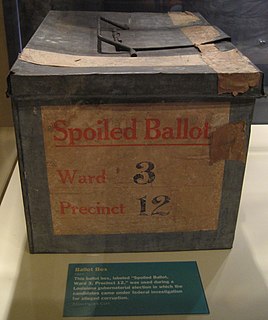 W
WA protest vote is a vote cast in an election to demonstrate dissatisfaction with the choice of candidates or the current political system. Protest voting takes a variety of forms and reflects numerous voter motivations, including political alienation.
 W
WIn elections in the United States, a provisional ballot is used to record a vote when there are questions about a given voter's eligibility that must be resolved before the vote can count. The federal Help America Vote Act of 2002 guarantees that, in most states, the voter can cast a provisional ballot if the voter states that they are entitled to vote.
 W
WPsephos: Adam Carr's Electoral Archive is an online archive of election statistics, and claims to be the world's largest online resource of such information. Psephos is maintained by Dr Adam Carr, of Melbourne, Australia, a historian and former aide to Australian MP Michael Danby and Senator David Feeney. It includes detailed statistics for presidential and legislative elections from 182 countries, with at least some statistics for every country that has what Carr considers to be genuine national elections.
 W
WA risk-limiting audit (RLA) is one way of checking whether computers tallied an election accurately. It involves (1) storing paper ballots securely until they can be checked, (2) manually comparing a statistical sample of paper ballots to the computers' records for those same ballots, and (3) checking whether all the computer records of ballots in the election were totalled correctly.
 W
WThe secret ballot, also known as the Australian ballot or Massachusetts ballot, is a voting method in which a voter's identity in an election or a referendum is anonymous. This forestalls attempts to influence the voter by intimidation, blackmailing, and potential vote buying. This system is one means of achieving the goal of political privacy.
 W
WA political stump speech is a standard speech used by a politician running for office. Typically a candidate who schedules many appearances prepares a short standardized stump speech that is repeated verbatim to each audience, before opening to questions.
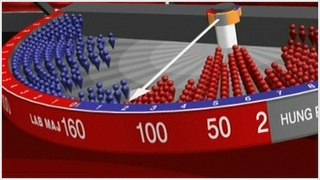 W
WThe swingometer is a graphics device that shows the effects of the swing from one party to another on British election results programmes. It is used to estimate the number of seats that will be won by different parties, given a particular national swing in the vote towards or away from a given party, and assuming that that percentage change in the vote will apply in each constituency. The device was invented by Peter Milne, and later refined by David Butler and Robert McKenzie.
 W
WA teller is a person who counts the votes in an election, vote, referendum or poll. Tellers are also known as scrutineers, poll-watchers, challengers or checkers.
 W
WThreeBallot is a voting protocol invented by Ron Rivest in 2006. ThreeBallot is an end-to-end (E2E) auditable voting system that can in principle be implemented on paper. The goal in its design was to provide some of the benefits of a cryptographic voting system without using cryptographic keys.
 W
WA ticket refers to a single election choice which fills more than one political office or seat. For example, in Guyana, the candidates for President and Parliament run on the same "ticket", because they are elected together on a single ballot question — as a vote for a given party-list in the Parliamentary election counts as a vote for the party's corresponding presidential candidate — rather than separately.
 W
WTraffic light coalition is a term originating in German politics where it describes a coalition government of the Social Democratic Party of Germany (SPD), the Free Democratic Party (FDP) and The Greens. It arises from the fact that the parties' traditional colours, respectively red, yellow and green, resemble the normal colour sequence of a traffic light (Ampel). It has subsequently been used to describe similar coalitions between social democrats, liberals and greens in other countries.
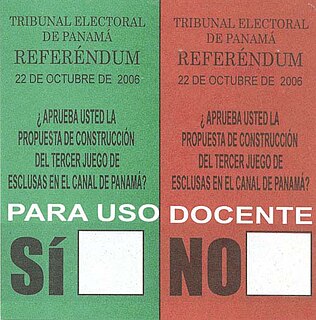 W
WVoting is a method for a group, such as a meeting or an electorate, in order to make a collective decision or express an opinion usually following discussions, debates or election campaigns. Democracies elect holders of high office by voting. Residents of a place represented by an elected official are called "constituents", and those constituents who cast a ballot for their chosen candidate are called "voters". There are different systems for collecting votes, but while many of the systems used in decision-making can also be used as electoral systems, any which cater for proportional representation can only be used in elections.
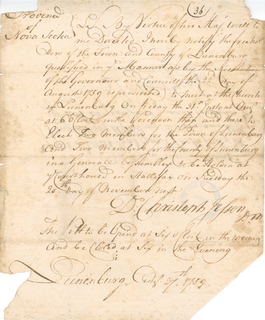 W
WA writ of election is a writ issued ordering the holding of an election. In Commonwealth countries writs are the usual mechanism by which general elections are called and are issued by the head of state or their representative. In the United States, it is more commonly used to call a special election for a political office.